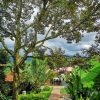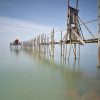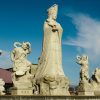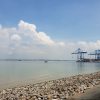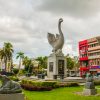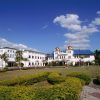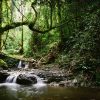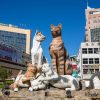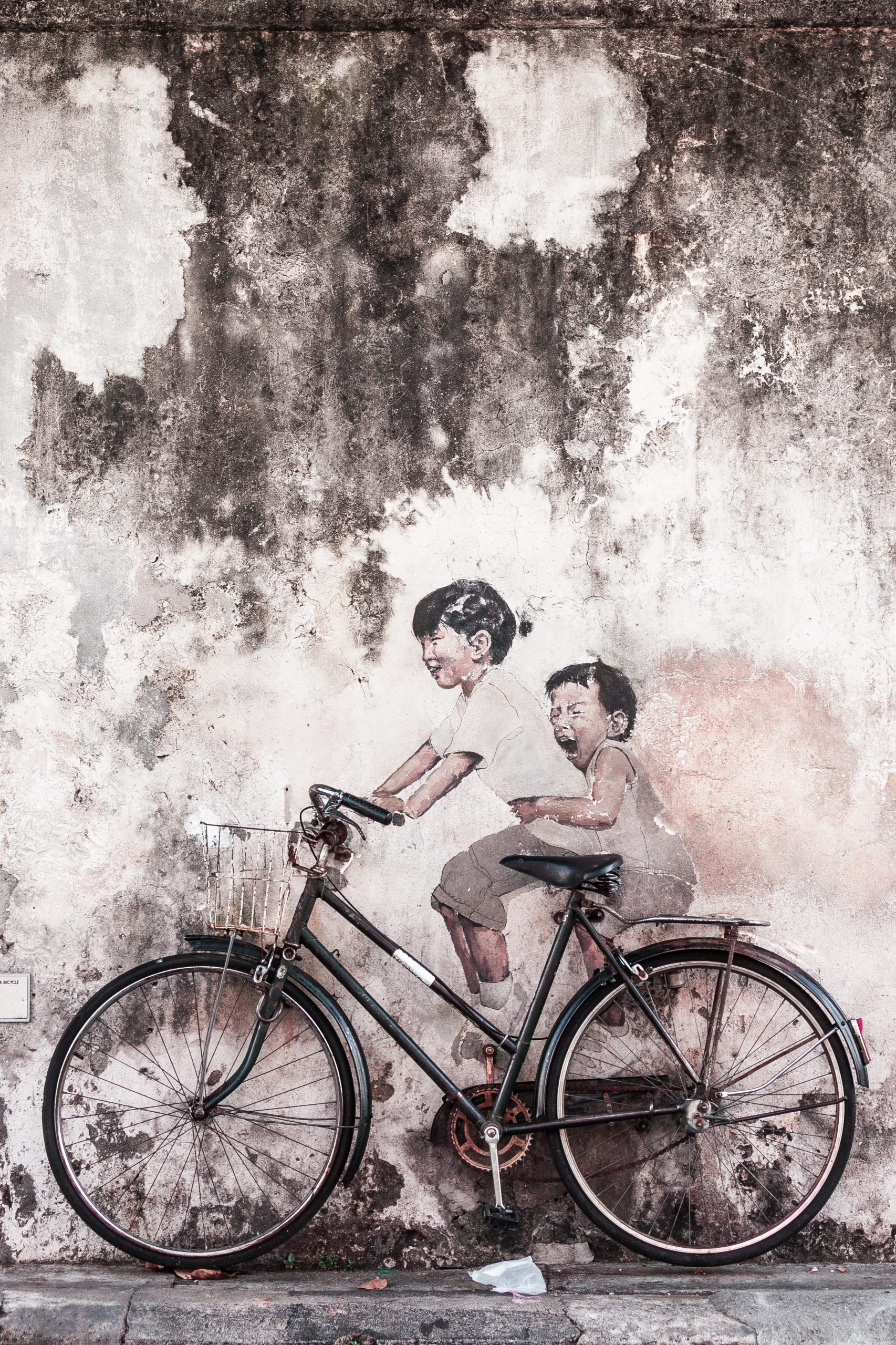
Johny Chee Boon Heng: Penang Peranakan Icon
by Johny Chee Boon Heng
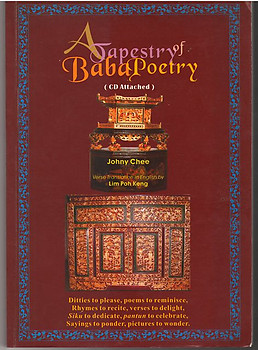
Brought up in a typical Penang Baba family, Johny Chee received his education in the English medium. After completing his studies in Penang Free School (the oldest English institution in SEA), he went on to earn credentials from Universiti Sains Malaysia, the University of London and the University of Malaya.
Areas which appeal to Johny included the arts, fine arts, performing arts, creative arts, humanities and the social sciences. He was also interested in peoples and their cultures. One particular area which draws close to his heart was the Baba language, traditions, practices and way of life.
Nonetheless, common among the Babas of those days, they ventured into the professional field rather than into the world of business. Johny Chee became a secondary school teacher eventually. As a widowed single father and twice a cancer fighter, it was trying for him to develop his passion for the Peranakan culture.
Nonetheless, after his retirement and the growing up of his child, he had the opportunity to further his interest into his Baba roots. He consequently joined the State Chinese Penang Association and became an active contributor to the promotion and revival of the Peranakan heritage.
This eventually led him to became an avid writer, performer and poet of the Penang Peranakan culture. He could be seen in many of Penang’s cultural events where he performed his songs together with the Nyonya Belles.
His self-authored book, “A Tapestry of Baba Poetry” published in four editions can be found throughout Malaysia’s bookstores. This self-published book was the result of Johny’s passion for heritage and culture.
Memorable Lines:
“For any culture to survive and remain vibrant, it has to grow.”
“Delivering poems through the medium of music helps to open up another avenue to revive the interest of our present-day society in Baba rhymes.”
“High or low, near or far, we should not only keep on seeking knowledge but be humble seekers of knowledge.”
“The morning of Chap Goh Mei should start with prayers to the ancestors and the deities. We will prepare traditional dishes such as glutinous rice and pengat, also known as bubur cha cha,”
“If we could exercise moderation in speech, thought and action, it would save ourselves, others and the world from a lot of uncalled-for problems, suffering and miseries.”
“Let us all hope and pray for the dawn of international understanding, world peace, harmonious co-existence amongst mankind.”
“By learning to respect on another we are learning how to respect ourselves because we belong to that species called ‘Man’.”
“Happy citizens is the key to the success and well-being of a nation.”
“We cannot take along the money that we have when we ‘go off’.”
“The tides of Time roll on. And we have to move along. Wherever we may be
May we always be happy.”
About A Tapestry of Baba Poetry Book:
Penang Hokkien is, by and large, Baba Hokkien. It differs from the original Hokkien dialect in terms of the pronunciation of certain words, its intonation and some aspects of its vocabulary. But although it may originate from Penang, the dialect and varieties of it are either spoken or understood as far as Phuket in Thailand and Medan in Indonesia. This book is on Penang Baba rhymes. The first portion of the book is dedicated to traditional or authentic ones. The greater part of the book comprises the author’s own poems and rhymes, written along the lines of the Penang Baba style.
Although there is an ever increasing range of books on the dress, architecture, furniture, silver and much else of the Babas and Nyonya/Straits Chinese there’s little published about how this mixed Chinese/Malay group amused themselves. Johny Chee brought together a wide selection of a mixed Chinese/Malay group’s traditional songs (with musical scores) and poetry. This book offers a fresh take on the Peranakan’s poetic style.
The book is a brave attempt to put in writing what is a largely oral tradition of poetry recital. Johny Chee adds a new dimension to the study of Baba poetry as his modern works are written in the Penang Baba Hokkien dialect rather than the Baba Malay used by the Melakans and Singaporeans. This publication showcases both traditional ditties and compositions of his own, accompanied by photographs of Baba artefacts and short pieces on customs and culture.
The transcribing of Hokkien into romanised alphabet by Johny Chee himself, makes for tedious reading. The translations by Lim Poh Keng, which were carefully rhymed in English was equally commendable as an onerous and courageous undertaking.
Johny Chee’s efforts to preserve and revive the Penang Baba cultural heritage and dialect, though not a simple task in our current society’s ongoing changes, nonetheless, deserve commendation.
On his personality & tributes
Lee Su Kim, Malaysian Author, Cultural Activist, Educator
“Baba Johnny Chee will always be remembered for his love of and contributions to the Baba Nyonya culture and keeping Penang Hokkien alive through his songs, poetry and books.”
Dato’ Wong Kam Hoong, Deputy Minister of Culture, Arts and Heritage Malaysia
“Motivated by the desire to preserve the national heritage, Mr. Johny Chee had undertaken the laborious task of writing a book on ‘A Tapestry of Baba Poetry’. He hopes to kindle interest in reviving the Penang Peranakan Culture.”
Peter Yeoh, Penang Food Reviewer
“We remembered how he gamely joined the keroncong singers on-stage although he wasn’t in the best of health then. Johny enjoyed life to the end. He lives on in our collective memories – a fun-loving individual with a love for singing.”
Tang Chin Yong, Penang Tai Chi Master
“Johny Chee was a good teacher and a good friend who helped people without words of return. He was an expert in the field of Peranakan, who worked hard on collecting Baba and Nyonya’s songs and publishing books at his own expense.”
Yam Kah Kean, Senior Lecturer & Ex-student of Johny Chee
“Born in Malaya into the house of elite. Writings and students scattered all around the world.”
Dato’ Khoo Keat Siew, Former President of The State Chinese Peranakan Association
“Johny Chee deserves our applause and support for his earnest desire and effort to keep the Penang Hokkien alive through his poems. He even goes to the extent to help promote and rekindle interest in the dialect among the present and future generations.”
The State Chinese Peranakan Association
“We have indeed lost a true blue Chinese Peranakan in him.”
Chee Yiu Jin, Educator, Son
Father, teacher, writer, twice a cancer survivor and a fighter. He was the best and most wonderful father I could have ever wished for. A responsible, caring and selfless individual who was always supportive, positive and encouraging with a passion for life, people and culture. Truly my inspiration and hero.
On his work
Dato Tan Gin Soon, Vice President, The State Chinese (Penang) Association“Interesting yet illuminating, entertaining yet enlightening–a literary encounter to feast the eyes. A book meant for everybody–of all ages and standings in society.”
Michael Cheah, Pinang Peranakan Museum Curator
“It is not just poetry in motion but Penang Hokkien in action. One is treated not only to a repertoire of Baba rhymes but an ensemble of quaint words and expressions peculiar to the Penang Baba tradition.”
Ee Sin Soo, Assistant Honorary Secretary, The Peranakan Magazine
“Unfamiliar to the language, it was an intriguing experience and music to my ears. The tones and syllables are simplified, though it all sounded Greek to me. Johny employed Hokkien adjectives to broaden the meaning in the subject matter or to modify it accordingly, when expedient. It was a privilege to be there.”
Helen Keane, ANU Professor
“I’ve really enjoyed reading it and wonder how much richer my experience would have been to have such a guide when I was living in Malaysia. It is quite a treasure for younger people living in Penang as an insight into their history and the history of their language.”
Dato’ Khoo Keat Siew, Former President of The State Chinese Peranakan Association
“His poems transcend cultural and national boundaries and should appeal to people from all walks of life and from various strata in society. Even those who do not understand (Penang) Hokkien can enjoy his book through the well-constructed verses written in English by his collaborator, Lim Poh Keng.”
Other Links & Media
Interviews
Catch the two-part talk by Johny Chee. First part is an introduction to his book, ’A Tapestry of Baba Poetry’ and The Straits Chinese heritage. While the second part sees his interpretation of what Penang Hokkien is.
Part 1 – https://youtu.be/uC4GTeLnt5s
Part 2 – https://youtu.be/GO-nhhNnlCU
Astro – ‘Whose Tradition’ Programme, where Johny Chee speaks about Baba folk songs and culture:
Part 1 – https://youtu.be/TwXSEwmZptQ
Part 2 – https://youtu.be/hx7hxfPC-WI
Videos
Performances of some of his songs:
https://www.youtube.com/watch?v=T9SWsUKygfM
Audios
Self-composed Songs
Audio for a couple of his self-composed songs are also available for listening at these links:
Baba and Nonya – https://youtu.be/pM-yzgMJLk0
Ch’ei It Chap Goh – https://youtu.be/f0uvX1wFjKY
Online texts:
https://www.emily2u.com/penang-baba-nyonya-dondang-sayang-chap-goh-meh-celebration/
https://www.what2seeonline.com/2010/10/baba-nyonya-wedding-with-a-peranakan-dining-experience/
https://www.asiaone.com/malaysia/chap-goh-mei-celebrations-start-prayers-families
http://mittaforlife.blogspot.com/2010/11/at-glance-sing-long-in-pure-lotus.html
http://naughtynyonya.blogspot.com/2016/08/penang-hokkien-english-dictionary.html?view=classic
http://missdimsum.blogspot.com/2013/01/baba-nyonya-wedding-thng-tok-dining.html
https://nickchan.net/hokkien-new-year-eve/
http://www.chinaheritagequarterly.org/articles.php?searchterm=026_confucius.inc&issue=026
https://focus.cari.com.my/forum.php?mod=viewthread&tid=1937547
Facebook:
https://www.facebook.com/baba.johny.5/
- Chee Yiu Jin kindly assisted on this article
